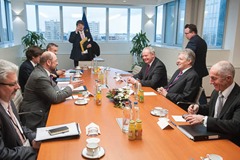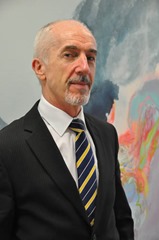The Executive’s presence in Europe
 The Head of the Office of the Northern Ireland Executive in Brussels, Gerry Mulligan, talks to Fiona McQuade about the devolved administration’s European presence.
The Head of the Office of the Northern Ireland Executive in Brussels, Gerry Mulligan, talks to Fiona McQuade about the devolved administration’s European presence.
Gerry Mulligan conveys the Office of the Northern Ireland Executive in Brussels (ONIEB) as “the eyes and ears of the Executive in Brussels” examining legislation and issues that affect Northern Ireland.
The Executive’s main priorities are to “influence policy and to derive as much benefit [as possible] from Europe, particularly maximising our take on structural and competitive funds, and also to promote the region.” This contrasts with the role of Northern Ireland Bureau in Washington which doesn’t have the same focus on legislation and funding.
Back in 2007, Commission President José Manuel Barroso created a dedicated taskforce to advise the region on getting the best out of European policies, funding programmes and networks. President Barroso was the first European leader to visit Northern Ireland after the power-sharing deal thus “underlining European support for the new institutions.”
Mulligan sees the taskforce as a strategic advantage for reaching key EU decision-makers and therefore influencing policy: “It is important if you want to influence and shape their thinking to be on their radar.”
He adds: “We will lobby, generally on emerging legislation alongside or on behalf of ministers or senior officials.”
He points to the example of Peace IV as a success, arguing its creation was dependent on lobbying and the First Minister and deputy First Minister meeting with key decision-makers such as Barroso, Martin Schulz and Herman Van Rompuy.
Mulligan draws attention to ONIEB’s role in the development of EU transport policy. The EU favours an extended and upgraded rail network (through electrification) which would have been “unnecessary” in Northern Ireland “given the limited scale of what we have.” Northern Ireland now benefits from exemptions which, he believes, will
allow roads infrastructure to continue to qualify for funding under the Connecting Europe facility.
Mulligan states that helping to develop programmes for Executive ministers is “at the core of what we do” and the office encourages ministers to visit. ONIEB provides them with logistical support and briefings, as well as organising meetings with political leaders and senior officials in Brussels.
When asked how much influence the ministers are able to provide, Mulligan remarks: “Foreign policy is not a transferred matter, but our ministers have the opportunity to discuss with UK [and other] ministers at Council any particular issues relating to Northern Ireland.” This, he added, is often done informally at the margins of Council meetings.
He adds: “The seat at the table is reserved for the UK lead Minister but there is no reason, in my view, why the Northern Irish ministers shouldn’t be at the table representing the UK position.”
 The office represents the entire Executive and at any time can speak on behalf of ministers if they are happy for its staff to do so: “It could be anything from speaking in Parliament or adjudicating a public speaking competition at a school. It is varied and interesting.” Mulligan gave evidence to the European Parliament during a debate on structural funds on behalf of the Department for Social Development.
The office represents the entire Executive and at any time can speak on behalf of ministers if they are happy for its staff to do so: “It could be anything from speaking in Parliament or adjudicating a public speaking competition at a school. It is varied and interesting.” Mulligan gave evidence to the European Parliament during a debate on structural funds on behalf of the Department for Social Development.
Mulligan relates that the office “provides a business location for anyone working in the interests of the region such as local government, [Assembly] committees and universities … it is a convenient location for those who are involved in consortia.” ONIEB is continually encouraging Northern Ireland residents to work in Brussels for a period of time.
‘The Brussels Platform’ programme frequently brings Northern Irish arts to Brussels. In March, the Pulitzer Prize-winning poet Paul Muldoon visited the ONIEB for a series of readings. The play ‘A Better Boy’ was also recently performed by Game of Thrones actor Ian McElhinney. Mulligan notes that the platform “shows off talent and gives the region profile.”
A lot of business in Brussels is done informally and networking opportunities are important. He describes the city as very open and adds: “There are no secrets in Brussels, there is just someone you have forgotten to meet.”
Mulligan shares his Brussels experience so far: “It’s been challenging, there are 260-odd regional representations bidding for the time of the key decision-makers. We do very well.” He adds: “It’s been educational. I know an awful lot more about how the EU functions. It is rewarding to see things you do in conjunction with others come to fruition … it makes a real difference and is enjoyable.”
Mulligan has observed a gradual change in EU governance: “The three main pillars of decision-making [are] effectively working together in that they recognise each other’s responsibilities.” The EU budget agreement is a prime example.
He adds: “The system is a lot less efficient, there are now a lot more stages … but it is bringing in the democratic arm, the European Parliament, which must be seen as a positive.” Finance is now a priority area and there is a need to “sell Europe and its benefits” to EU citizens, particularly in the light of the financial crisis. He emphasises the importance of “making the case for synergy to persuade citizens that the European project is worthwhile.”
Last autumn, the Eurobarometer poll, which measures EU public opinion, showed that 45 per cent of EU citizens had seen the economic situation as the most important issue facing the EU, though this has dropped by 8 per cent on the previous year. Mulligan remarks: “You can’t sell Europe, in particular to younger people, only on the basis of it underpinning peace and security anymore.” He concludes that younger citizens need to also be persuaded by the financial benefits and the debate “needs to change towards the economic benefits and in terms of growth and jobs.”





